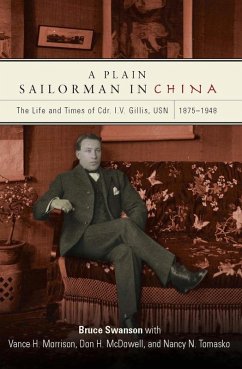A Plain Sailorman in China is a biography of Cdr. Irvin Van Gorder Gillis, USN that recounts both his extraordinary family history - a fascinating slice of Americana in the 1800's - and Irvin's multi-faceted career as a naval officer for 25 years and then as successful rare Chinese book collector. Son of a U. S. Navy Rear Admiral, as a U.S. Naval Academy graduate in 1894 he distinguished himself academically at the Academy and soon operationally while serving aboard his first U. S. Navy warships. Assigned to a torpedo boat in the Spanish-American War, he was hailed a hero for disarming a live Spanish torpedo while it was still floating in the sea. A talented naval engineer as well as leader of men, Gillis rapidly was selected to command a series of U.S. Navy warships, initially the torpedo boat in which he served during the war. His second command, USS Annapolis, took him to Asia for the first time where he saw action in the Philippines during the insurrection there. After another tour in command of a monitor assigned to China and service in two battleships, he was assigned as Assistant U. S. Naval Attaché in Tokyo to observe the Russo-Japanese War. Following more sea duty in the Atlantic he was sent to Peking as the first U. S. Naval Attaché to China, a job he held three times over the following 12 years. Following the second of these tours, and during his first period of retirement from the Navy in 1914, he was designated as chief intelligence officer for the Navy in China - and perhaps for other government intelligence collectors as well - while simultaneously working for Bethlehem Steel Corporation and Electric Boat Company as their China representative to sell warships to the Chinese Navy. In 1917 he was recalled to active duty for his third tour as U. S. Naval Attaché to China to replace the incumbent who was reassigned to command a destroyer in World War I. Following the end of the war, Gillis was released from active duty and settled into his life as a civilian. Married to a Chinese princess - possibly with two children -he remained in China from 1914 until his death in 1948, primarily collecting, sorting, cataloguing, binding and shipping tens of thousands of volumes of rare Chinese manuscripts that ultimately were to reside in Princeton University's East Asian Library. During World War II, he and his wife were interned at the former British Embassy in Peking, returning after to war to his old home near the Forbidden City until his death a few years later."
Dieser Download kann aus rechtlichen Gründen nur mit Rechnungsadresse in A, D ausgeliefert werden.









